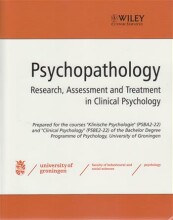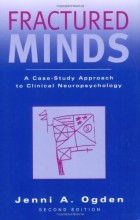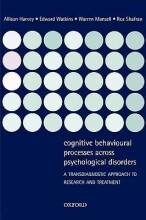Summary: Capita Selecta In Clinical Psychology | I Wessel, et al
- This + 400k other summaries
- A unique study and practice tool
- Never study anything twice again
- Get the grades you hope for
- 100% sure, 100% understanding
Read the summary and the most important questions on Capita Selecta in Clinical Psychology | I. Wessel and M. aan het Rot
-
4 Resilience
This is a preview. There are 7 more flashcards available for chapter 4
Show more cards here -
Protective factors within the child include
- Good intellectual ability and problem-solving abilities
- Easy-going temperament and a personality that can adapt to change
- Positive self-image and personal effectiveness
- Optimistic outlook
- Ability to regulate and control emotions and impulses
- Individual talents that are valued by the individual and by his or her culture
- Healthy sense of humor
-
Protective factors within the family
- Close relationship parents
- warm and supportive parenting
- minimal conflict
- structured and organized home environment
- involved in education
- adequate financial resources
-
Protective factors within the community
- good school
- involvement in social organizations
- involved and caring people
- safe neighborhood
-
Socioemotional selectivity theory
As people realize they have fewer years remaining in their lives, they begin to shift their attention away froma ctivities and goals related to the future and come to focus more on the present. -
Basic assumptions that are challenged by trauma
- Belief in personal invulnerability
- Perception of the world as meaningful and comprehensible
- View of ourselves in a positive light
-
Positive changes reported in posttraumatic growth literature
Changes in perception- An increased feeling of personal strength, confidence and self-reliance
- Greater appreciation of the fragility of life, including one's own
- Perceptions of self as survivor rather than a victim
Changes in relationships- Closer ties to family
- Greater emotional disclosure and feelings of closeness to others
- More compassion for others and more willingness to give to others
Changes in life priorities- Increased clarity about what is most important in life
- A deeper and often spiritual sense of the meaning in life
- A new commitment to take life easier
- Less concern with acquiring material possessions, money, and social status
-
8 Clinical Forensic Psychology
This is a preview. There are 52 more flashcards available for chapter 8
Show more cards here -
One-sided suicide pacts
The sufferer sees only a bleak future in a threatening world for those close to them, their way out being to kill their loved ones then themselves. -
Children and Young Persons'Act
Assumes that young criminals are victims rather than onherently 'bad' and that delinquency is a cry for help. It is difficult for society to accept that persons of sound mind offend willingly and uninfluenced, as anyone could then be a criminal. -
Latent delinquency (Early psychodynamic approach)
Here a lack of socialisation due to a failure of the reality principle results in a weak superego, leaving a latent form of the pleasure principle guiding behavior. -
Differential association theory
Crime is learned by association with other criminally inclined people in close personal groups.
- Higher grades + faster learning
- Never study anything twice
- 100% sure, 100% understanding
































